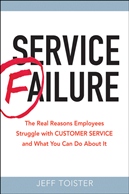Why the boss asks employees to do their dirty work
 Jeff Toister
Jeff Toister  Thursday, January 13, 2011 at 10:52AM |
Thursday, January 13, 2011 at 10:52AM | My wife, Sally, and I just had hardwood floors installed in our home, finally replacing carpeting that looked old and outdated when we moved in nine years ago. It looks beautiful and the workmanship is outstanding, but the job was not without adventure. Our installer ran out of materials - twice. Worse, our installer had to share the bad news with us personally rather than the owner of the company (who was our salesperson) picking up the phone to apologize and give us the update herself.
 This situation raises an interesting question. Why are bosses and business owners so willing to put their employees in the line of fire rather than handling their own mess?
This situation raises an interesting question. Why are bosses and business owners so willing to put their employees in the line of fire rather than handling their own mess?
Social scientists at Carnegie Mellon University discovered a possible explanation. They conducted an experiment where participants were given $10 and instructed to share as much as they'd like with another participant. Next, they were asked to repeat the experiment, but this time they used an itermediary (i.e. 'employee') to share the money on their behalf. On average, participants shared $1 less when using an intermediary than when they shared the money directly. The implication is it is easier to do something unfavorable to another person if we do it through an employee.
(Ok, that was a very superficial summary. If you are a nerd like me, you can read the whole study here.)
The CBS show Undercover Boss is another great illustration of this phenomenon. In each episode, a senior executive goes 'undercover' to work frontline positions in his or her company. One episode featured the owner of a fulfillment company taking calls in a call center. He quickly realizes how these employees are put in impossible situations where they don't have the training or authority to provide appropriate solutions to customer problems. (See my previous post about the show.)
Other examples abound. How else could bank executives ask their employees to enforce unpopular fees in the name of profitability while giving themselves outsized bonuses? Why do we spend 10 minutes arguing with a frontline employee who says they are only following policy and then the supervisor overrides the policy to give us what we want immediately?




Reader Comments